|
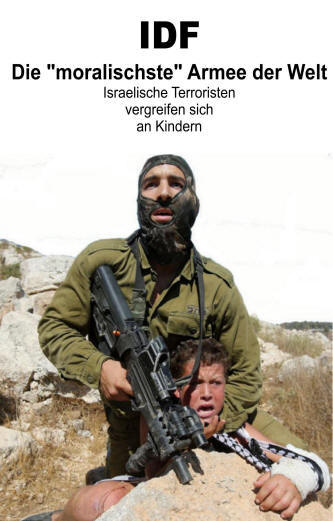 Palästinenserkind
im Schwitzkasten
- Von Inge Günther - (...) Viele Israelis
indes sind empört, wie besagter Soldat
und mit ihm die ganze Armee sich hätten
vorführen lassen. Miri Regev, strammrechte
Kulturministerin, machte sich sogleich
dafür stark, dass Soldaten im ähnlichen
Fall besser schießen sollten. Wohlgemerkt,
zu keinem Moment bestand für den Soldaten
Lebensgefahr. Ohnehin ist die Liste
palästinensischer Zivilisten, die bei
anderen Zusammenstößen erschossen wurden,
erschreckend lang. Palästinenserkind
im Schwitzkasten
- Von Inge Günther - (...) Viele Israelis
indes sind empört, wie besagter Soldat
und mit ihm die ganze Armee sich hätten
vorführen lassen. Miri Regev, strammrechte
Kulturministerin, machte sich sogleich
dafür stark, dass Soldaten im ähnlichen
Fall besser schießen sollten. Wohlgemerkt,
zu keinem Moment bestand für den Soldaten
Lebensgefahr. Ohnehin ist die Liste
palästinensischer Zivilisten, die bei
anderen Zusammenstößen erschossen wurden,
erschreckend lang.
Aber das Bedürfnis, nach der Schmach
von Nabi Saleh ein Exempel zu statuieren,
ist groß. Einige israelische Eltern
forderten, wenigsten einen linken Lehrer,
der mit den Palästinensern demonstrierte,
zu suspendieren. Die Frage, warum Soldaten
überhaupt Kindern hinterher jagen, stellten
nur wenige. Vielleicht aus Scham, vielleicht
auch, weil die Antwort mit der seit
bald fünf Jahrzehnten währenden Besetzung
der palästinensischen Gebiete zu tun
hat Und die, so „Haaretz“-Kommentator
Anshel Pfeffer, „zerfrisst unsere Armee
und unsere Gesellschaft“. Man möchte
sich gerne als tapferer David sehen
und ähnelt doch immer mehr Goliath.
>>>
Debatte um Gewalt israelischer
Soldaten : Die Hilflosigkeit der
Besatzer -
Christoph Sydow - Ein Video aus dem
Westjordanland zeigt, wie ein
israelischer Soldat einen
palästinensischen Jungen würgt. Die
Regierung beklagt eine
"Pallywood"-Inszenierung - doch die
Bilder belegen schlicht das
Ungleichgewicht im Nahostkonflikt.
Die Bilder gingen um die Welt: Ein
israelischer Soldat hält einen
elfjährigen Jungen im Schwitzkasten.
Der linke Arm des Kindes steckt in
einem Gipsverband, es weint und
schreit. Zwei Frauen und ein Mädchen
versuchen, den Jungen aus dem
Würgegriff des Soldaten zu befreien.
>>>
Leserbrief zum Artikel "Ein
Bild mit zwei Geschichten" von Peter
Münch in der SZ vom 31.08.2015
- Karin Nebauer
- Ein Video von der brutalen Festnahme
eines 12-jährigen Buben mit Gipsarm
im Anschluß an eine friedliche Demonstration
gegen Landraub in Nabi Saleh/Westbank
durch einen israelischen Soldaten ist
weltweit online zu sehen.
Zu dem Artikel von Peter Münch und dem
dazu ausgewählten Bild aus dem Video
gibt es allerdings mehrere Geschichten,
nicht nur zwei. Um sich der Geschichte
dieser Festnahme zu nähern, sollte man
sich das ganze Video anschauen: ein
schwer bewaffneter Soldat jagt nach
der Demonstration einen Jungen mit einem
Gipsarm, erwischt ihn und drückt ihn
mit Würgegriff gegen einen Felsbrocken.
Der Junge schreit, Frauen scharen sich
dann um den Soldaten und zerren an ihm
und dem Kind, um das Kind zu befreien.
Peter Münch schreibt, der Junge habe
nach Armee-Angaben Steine geworfen.
Dazu weitere Geschichten: Die Demonstration
in Nabi Saleh findet seit mehreren Jahren
jeden Freitag statt und ist eine friedliche.
Sie wird regelmäßig von schwerbewaffneten
israelischen Soldaten mit Tränengas,
Blendgranaten, Gummigeschossen und auch
scharfer Munition aufgelöst. Es geht
darum, Widerstand gegen Besatzung, Landenteignung,
Häuserzerstörungen und Siedlungbau zu
unterdrücken und möglichst schon bei
der jungen Generation. So sind seit
mehr als 20 Jahren sind Kinder und Jugendliche
ein bevorzugtes Ziel der Gewalt der
israelischen Streitkräfte.
In der Westbank werden jedes Jahr 700
bis 800 palästinensische Kinder festgenommen
und inhaftiert, 2012 waren es 881, 2014
bereits 1.266. Meistens wird ihnen vorgeworfen,
Steine geworfen zu haben, was als schweres
Sicherheitsdelikt gilt und mit bis zu
20 Jahren Haft bestraft werden kann.
Die Anklage gründet sich auf die Aussagen
der israelischen Armee oder Polizei,
andere Beweise oder Zeugen werden nicht
zugelassen. Unter dem Druck verbaler
und physischer Mißhandlungen bekennen
sich die meisten Kinder schuldig und
unterschreiben ein Geständnis, das oft
in hebräisch abgefasst ist und sind
damit vorbestraft.
Israelische Soldaten haben der Organisation
'Breaking the Silence' erzählt, wie
sie palästinensische Kinder gejagt,
festgenommen, mißhandelt, oder sogar
getötet haben, oft willkürlich und ohne
zur Verantwortung gezogen zu werden.
Dazu gibt es viele Bericht von B'Tselem,
Defense for Children International,
Unicef, Amnesty International, Human
Right Watch u.a.
Die Strafen für palästinensische Kinder
sind hart, viel härter als für jüdische
Kinder. Monate und Jahre lange Haftstrafen,
Isolationshaft, Schlafentzug, Mißhandlungen..
Siedler dagegen, die Palästinenser -
Erwachsene und Kinder - angreifen, bleiben
in der Regel straflos. Bis jetzt hat
die Polizei auch noch keinen für die
letzten beiden Brandanschläge auf palästinensische
Häuser in Kafr Duma bei Nablus verdächtigen
Siedler vor Gericht gebracht. Neun verdächtige
Siedler waren zwar in Administrativhaft
(ohne Anklage, ohne Prozess) genommen
worden, aber wenige Tage später wieder
freigelassen.
Westjordanland
- Ein Bild mit zwei Geschichten -
>>>
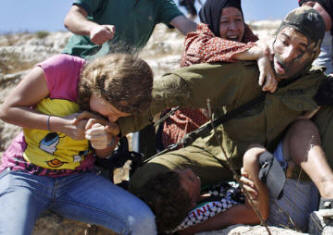
Meet
the teenage girls behind the viral photo
from Nabi Saleh
- Allison Deger - “The pictures went
viral. That’s important,” Ahed Tamimi,
14, said, “so the world can see what
happens.” Ahed is the blond teen on
the far left of the widely-published
photo of a violent confrontation between
Palestinian women and children, and
an Israeli soldier in the West Bank
village of Nabi Saleh. In the frame
Ahed is seen biting the soldier after
he hits her in the face. Since the now
infamous images were first published,
the Tamimis, and Ahed in particular,
have been visited by droves of journalists
wanting to know how the Palestinian
family felt when they saw 12-year old
Mohammed Tamimi, also known as Abu Yazan,
slammed to the ground. >>>
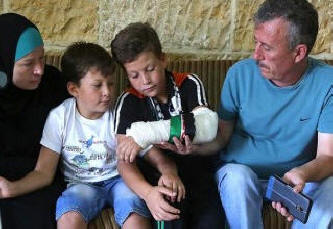 Israel
arrests parents of boy beaten at Friday
rally - Self-proclaimed
Jewish state arrests father of 12-year-old
Palestinian boy beaten on Friday by
Israeli soldier Israel
arrests parents of boy beaten at Friday
rally - Self-proclaimed
Jewish state arrests father of 12-year-old
Palestinian boy beaten on Friday by
Israeli soldier
Israel on Tuesday arrested Palestinian
activist Basil al-Tamimi, the father
of 12-year-old Mohamed al-Tamimi, who
was beaten by an Israeli soldier during
a Friday demonstration in the occupied
West Bank.
“The Israeli army arrested Basil and
his wife, Nariman, as they tried to
cross an army checkpoint at the entrance
of Nabi Saleh village north of Ramallah,”
Bassam al-Tamimi, another Palestinian
activist, told Anadolu Agency. “Soldiers
arrested Basel and his wife and prevented
us from communicating with them.” >>>
Nabi
saleh 28 8 2015
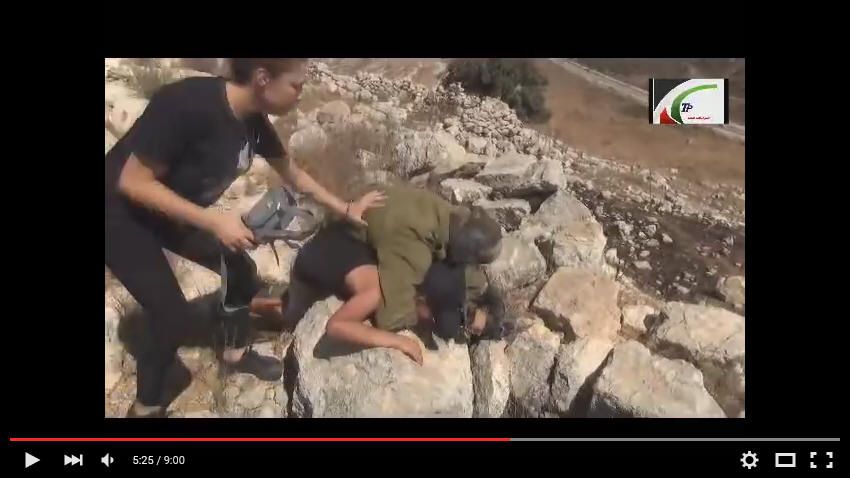
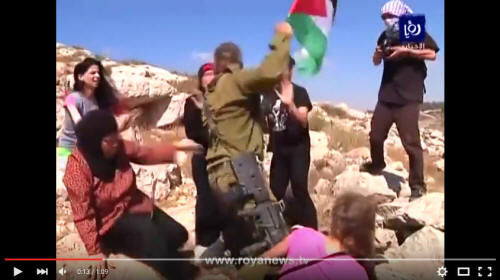
Mehr
zum Thema auf einer Sonderseite
>>>
|